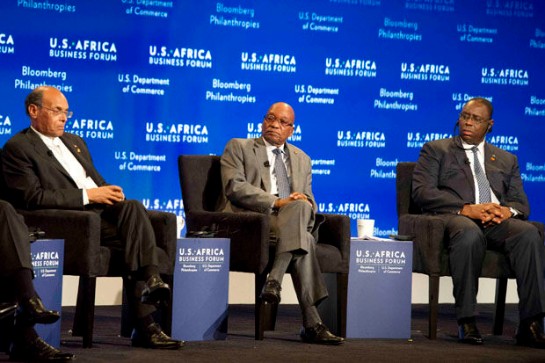
Future US-Africa Trade Hinges on Ex-Im Support
As the US-Africa Leaders Summit hits its midway point, there has been a lot of buzz around Washington concerning the future trade and investment relationship between US businesses and the African continent, which is home to 7 of the 10 fastest growing economies in the world today. As it stands, the US has a free trade agreement in place with only 1 African state (Morocco) and Bilateral Investment Treaties in place with just 9. After a 2008 peak, US trade relations with Africa sharply declined during the global financial crisis and have struggled to recover. Meanwhile, China has quietly yet efficiently ramped up its own trade relations with Africa, surpassing the US in total trade in 2009 and widening the gap since. In 2013, China’s trade relations with Africa stood at 2.5 times that of the US ($210 billion compared to $85 billion).
As the September 30 deadline to renew the charter for the Export-Import Bank draws near and its future up in the air, let’s take a look at the role Ex-Im has played in facilitating trade relations with Africa. By providing loan guarantees and insurance for international transactions, Ex-Im gives US firms a hedge against the risk of doing business abroad, a primary concern when conducting business with some of the rising yet underdeveloped economies in Africa. In 2013, Ex-Im approved an all-time high 188 authorizations to 35 of the 49 nations of sub-Saharan Africa, accounting for $604 million in financing. In the coming years, economic growth will lead to billions of dollars in infrastructure investment on the part of African nations, and goods and services produced in the US will be in high demand – Ex-Im can play a key role in getting them there.
A look at some of the projects financed by Ex-Im in 2013 show the potential for US companies to benefit from investment in African infrastructure: a loan to Ghana financing exports from a Miami company to design and construct a state-of-the-art hospital in its capital city; a loan to Nigeria facilitating the purchase of 32 fire trucks made in Illinois; a loan guarantee to South Africa in its purchase of 53 automotive kits from General Electric that will be used to build port and pipeline infrastructure. In the future, Ex-Im financing will be crucial in allowing US businesses to take advantage of these export opportunities in Africa, particularly in light of the steadily increasing Chinese footprint in the region.
Ex-Im strongly supports other US development goals in Africa, pledging $5 billion in support for the Power Africa initiative, which has the mission of doubling access to electricity in sub-Saharan Africa over the next five years. The bank also supports the US-Africa Clean Energy Development and Finance Center as well as the Doing Business in Africa initiative.
The bank is also a vital instrument of America’s national security. Through its investments and economic strength, it creates stability, business, jobs, and hope. It goes to places we don’t want or need the American military to go, and is just as vital to American influence and power as DoD and the State Department.
Make no mistake, it is still a relatively risky enterprise to do business in Africa given their underdeveloped financial institutions and rampant corruption among top officials, but this is precisely why Ex-Im is such an important player in US trade with Africa at the present. When the private sector is unwilling or unable to assume the risk in conducting business with a foreign government (which is often the case), US firms look to Ex-Im. Because Ex-Im enjoys the favored position of borrowing money at dirt-low US Treasury rates, it can offer low interest, long-term repayment plans that commercial banks couldn’t dream of – and its scant default rate (just under 0.25% in 2013) indicates just how good it is at gauging the international market.
Ex-Im has now become a political target amid cries that it represents “crony capitalism” leading into the November midterm elections, with a number of politicians urging Congress not to reauthorize its charter. If the US wants to capitalize on the money to be made in emerging markets with a rising middle class and a goldmine of infrastructure needs, getting rid of Ex-Im makes no sense. Every other developed nation, including China, utilizes some form of an export credit agency and without the support of Ex-Im, US firms will be unable to compete in Africa.
Ex-Im has an important role to play in the future of US trade around the world, and particularly in Africa – as one African business leader said this week: “Not reauthorizing Ex-Im is voting against the development of Africa.”






[…] Future US-Africa Trade Hinges on Ex-Im Support […]